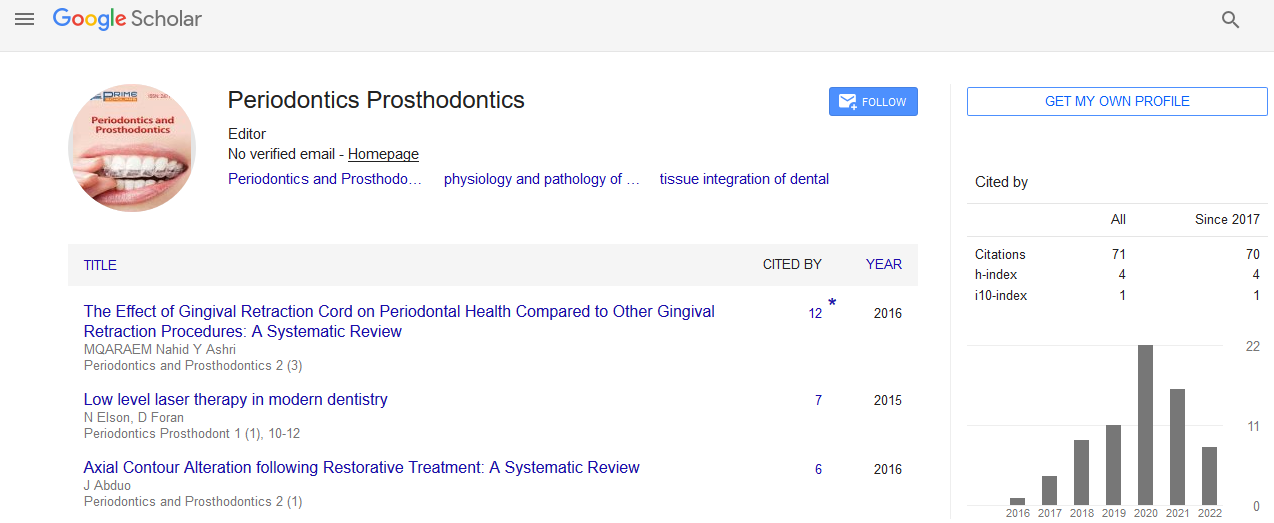Opinion - (2024) Volume 10, Issue 2
Oral Bacteria: The Tiny Guardians and Invaders of Oral Health
Jack Walker*
Department of Denstistry, Duke University, USA
*Correspondence:
Jack Walker,
Department of Denstistry, Duke University,
USA,
Email:
Received: 29-May-2024, Manuscript No. IPPDPD-24-20870;
Editor assigned: 31-May-2024, Pre QC No. IPPDPD-24-20870 (PQ);
Reviewed: 14-Jun-2024, QC No. IPPDPD-24-20870;
Revised: 19-Jun-2024, Manuscript No. IPPDPD-24-20870 (R);
Published:
26-Jun-2024, DOI: 10.36648/2471-3082.24.10.14
Introduction
The human mouth is a complex ecosystem home to billions of
bacteria, playing a crucial role in maintaining oral and overall
health. While some bacteria are beneficial, others can contribute
to dental diseases and systemic health issues. Understanding the
delicate balance of oral bacteria is essential for effective oral care
and overall well-being. This article explores the significance of
oral bacteria, their impact on health, and strategies to maintain
a healthy oral micro biome. Oral bacteria are microscopic organisms
that inhabit various surfaces within the mouth, including
the teeth, gums, tongue, and cheeks. The oral micro biome, the
community of bacteria and other microorganisms in the mouth,
is dynamic and complex. It consists of hundreds of different bacterial
species, each with unique roles and interactions. The balance
of these bacteria is critical for maintaining oral health.
Description
Beneficial bacteria in the mouth perform several essential functions.
They help break down food particles, produce vitamins,
and maintain the pH balance of the oral environment. These
bacteria also play a protective role by inhibiting the growth of
harmful pathogens through competitive exclusion and the production
of antimicrobial substances. A healthy oral micro biome
supports the immune system, preventing infections and inflammation.
However, when the balance of oral bacteria is disrupted,
harmful bacteria can proliferate, leading to dental diseases
such as cavities and periodontal (gum) disease. The primary
culprits behind tooth decay are acid-producing bacteria like
Streptococcus mutans. These bacteria metabolize sugars from
food and beverages, producing acids that erode tooth enamel
and create cavities. On the other hand, periodontal disease is
caused by bacteria like Porphyromonas gingivitis, which trigger
inflammation and destruction of gum tissue and bone, potentially
leading to tooth loss. The implications of oral bacteria extend
beyond the mouth. Research has shown that oral infections can
have systemic effects, linking poor oral health to conditions such
as cardiovascular disease, diabetes, and respiratory infections.
For instance, bacteria from periodontal infections can enter the
bloodstream, contributing to the formation of arterial plaques
and increasing the risk of heart disease. Similarly, chronic oral
inflammation can exacerbate insulin resistance, complicating diabetes
management. Maintaining a balanced oral micro biome
is crucial for preventing these health issues. Good oral hygiene
practices are the cornerstone of oral health. Brushing teeth twice
a day with fluoride toothpaste, flossing daily, and using an antiseptic
mouthwash can help reduce harmful bacteria and prevent
plaque build-ups. Regular dental check-ups are also essential for
early detection and treatment of potential problems. Diet plays a
significant role in the health of the oral micro biome. A diet high
in sugars and refined carbohydrates can fuel harmful bacteria,
increasing the risk of cavities and gum disease.
Conclusion
Oral bacteria play a pivotal role in maintaining oral health and
overall well-being. The balance between beneficial and harmful
bacteria in the mouth is delicate and crucial for preventing
dental diseases and systemic health issues. By understanding the
importance of the oral micro biome and adopting effective oral
hygiene practices, individuals can support a healthy balance of
oral bacteria. Regular dental care, a balanced diet, and mindful
use of dental products are essential strategies for maintaining a
healthy oral ecosystem. Recognizing the impact of oral bacteria
on overall health underscores the importance of comprehensive.
Citation: Walker J (2024) Oral Bacteria: The Tiny Guardians and Invaders of Oral Health. Periodon Prosthodon. 10:14.
Copyright: © 2024 Walker J. This is an open-access article distributed under the terms of the Creative Commons Attribution License, which permits unrestricted use, distribution, and reproduction in any medium, provided the original author and source are credited.

